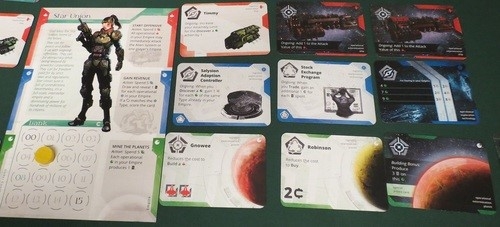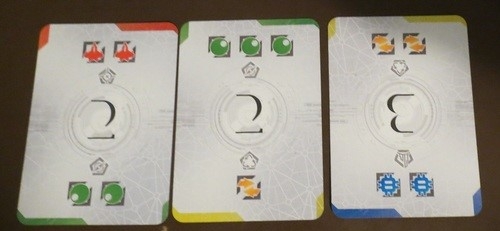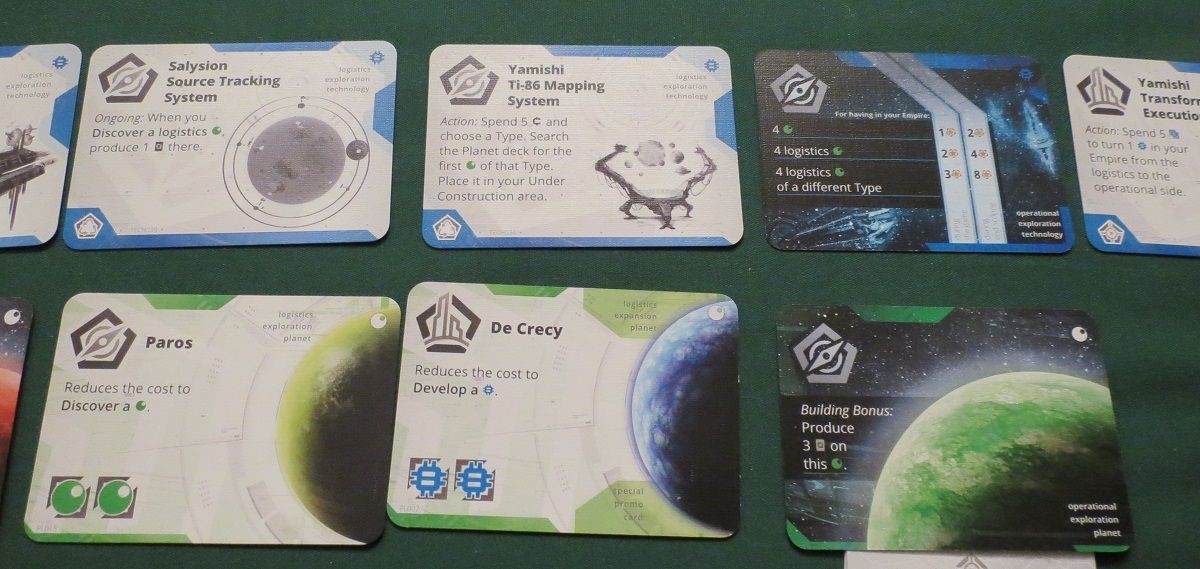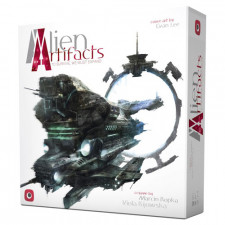Alien Artifacts Review
on Jan 18, 2018
Critical Hits: Terrific visual design; interesting resource card mechanic
Critical Misses: Turgid, un-fun card play; messy and overly complicated design
Alien Artifacts is the new engine-building tableau card game from Polish imprint Portal, and fans of 51st State and Imperial Settlers ought to take note, with caution. The gameplay is significantly different and the setting is more of a 4x-style space empires deal, and like those two games it offers a similar sense of developing combinations for scoring and resource gathering, establishing discount loops, and converting materials into victory point values. If all of that sounded like not much fun to those unfamiliar with the titles mentioned, it could be because quite frankly it really isn't.
The game looks dynamite, with a stark white box and stellar graphic design throughout and some truly outstanding pieces of sci-fi genre illustration. And it is easy to get excited by the implicit promise that the game is offering a 4x experience in an about an hour. But once you wade through the frustratingly unclear rules to get to the repetitive and over-complicated gameplay, Alien Artifacts is a sharp disappointment that pales in comparison to similar games in this category, which would include all-time greats such as Race for the Galaxy, Innovation, and San Juan.

Each player takes on the role of a faction with, of course, a special ability and a unique setup to kickstart their imperial tableau. Each faction card has a left side, which indicates cards that are in development and not available for use, and a right side where you put them when you actually pay the resources to make them functional. And each side has an Operational side and a Logistical one, with different effects based on the choice you make when you add them to your empire. There are three different classes of cards - ships, tech, and planets - and within each category the cards have some fundamentally similar qualities. Ships affect combat on their operational side but do things such as increase your "Assembly Limit" (more on that forthcoming). Technologies give various bonuses and effects when logistically oriented but provide set-based scoring opportunities immediately and at the end of the game when operational. Planets offer discounts on their logistics side or operationally produce additional resource cards.
The resource mechanic is interesting, but really quite frustrating. You have a hand of three cards with two instances of four different suits. Red builds ships, blue tech, green planets. Yellow is the "wild" gold option. Each suit has between one and three icons. In order to build something- which means to move it from the left to the right- you have to pay five corresponding resources plus one for each card of that type already in your empire. Minus, of course, any bonuses you have. The catch is you can only use two cards, which is your assembly limit. Increasing your limit becomes incredibly important as your empire gets bigger, to the point where you might find yourself struggling. This means turn after turn of paying credits to draft cards until you get a ship that increases your assembly limit or a planet that gives you a discount.

You see, in order to get cards into development on the left side of your card, you have to buy them. This means spending 5 credits (another resource) plus one for each additional draw if you don't want to topdeck the available ship, tech, or planet- remember, the cards are double-sided. Credits are earned by trading in sets of resources- again, adhering to the assembly limit. In most games I've played, there have been quite a few turns of relatively inconsequential woe as players try to dig out a card to increase their ability to explore a planet or build a ship because they've overextended a bit. Which is fairly appropriate given the setting, but it's also not much to be on the back heel and taking turns just trying to get something moving by discarding for credits, hoping to draw high value resource cards.
There is also a very lackluster suite of combat mechanics, wherein you can either use an action to attack or launch an offensive (two different options with similar outcomes, and a great example of how overly complicated the game is). It's a boring routine wherein you flip a card and that's your attack strength plus bonuses, then you compare to either a neutral Alien System defense card or against another player's Defense Plan card, which they earn by building cards of the Exploitation type. The outcome is based on your final strength. You can put blockades on other player's planets to make them pay money to use them or you can sack those Alien Systems for their artifacts.
And talk about underwhelming. For a game called Alien Artifacts, you'd think that getting ahold of one would really be something. Almost always, they are not. And in fact, they can sometimes be much less desirable than simply taking some victory points. Minor special abilities, free builds, adding cards to your in-progress area...nothing is terribly exciting, and in fact I think the game would have been better off without them because it's just one more fussy elements of a game that has a lot of fussy elements.

The scoring and evaluation is also rather ho-hum. Your faction dictates which kinds of empire cards- Extermination, Exploration, Exploitation, and Expansion give you points at the end. You also re-score any operational technology cards, which give you points for having three planets, three ships, three different types of ships and planets, those kinds of things. And it all ends when the resource deck runs out a certain number of times based on the number of players, which is kind of weird because combat heavy games tend to run out quicker because you use the resource cards in combat. Kind of a bad design decision, I think.
The game is a mess, despite its clean, cool presentation. The engine building element works fine and hardcore fans of this kind of game may very well glom to the numerous decision points and the relatively solitaire gameplay. But it feels like too much of an effort was made to try to pack in a bunch of various elements from larger 4x games that the designers lost sight of the value of a stronger, stricter editorial eye. The irony is that it is less complex and less icon-y than Race for the Galaxy, but the systems in that game feel more coherent and consistent and that provides a more enjoyable gameplay experience.
Worst of all, Alien Artifacts just isn't much fun. It lacks drama, narrative and tension and it doesn't have the sense of satisfaction that really ought to be a requirement for any kind of empire or economy building game. It is the quintessential example of a game where players keep their heads down and calculate values, reading card text, and looking for the combos and loops that will give them the ability to squeeze out +1 VP. A solitaire option like that found in Imperial Settlers might have helped somewhat, but even then I'd rather play the Race for the Galaxy app on my phone than set this clunky game up for another round.

 Customer Support
Customer Support  Subscribe
Subscribe 




 Account
Account  Wishlist
Wishlist 

